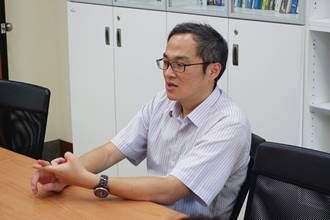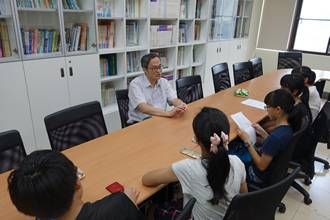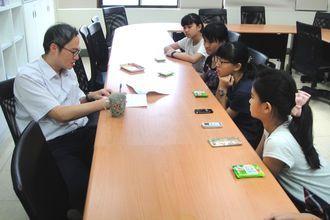


Establish a Sustainable Ecological City
Date of Visit: 2017.4.12
Visiting locations: Department of Social and Regional Development, National Taipei University of Education
Interviewee: Professor Lin Zhengyi
Research Expertise: Urban and Regional Planning, Urban Cultural Economy, Cultural Orientation Urban Regeneration, Creative Urban Studies, Cultural Industries



1. What indicators and conditions does promoting Eco-city need?
The most basic indicator and condition for achieving an eco-city are to do a good job in environmental protection and energy conservation and carbon reduction. People in cities must have good awareness of environmental protection and practical actions to protect the environment, recycle resources, and even use resources to reduce energy consumption. For example, if we are riding a bicycle or walking to school, we will reduce energy consumption. This is what we can do. And then driving cars will emit carbon dioxide, generate greenhouse gases, and cause global warming. But riding a bicycle won’t. Lastly, we should reduce the energy consumption of the industry. Because we develop a lot of industries, it will emit huge amounts of carbon dioxide. Therefore, whether the industry can be reduced or not is an important indicator.
2. Is Taiwan currently able to promote eco-cities with sufficient capacity and conditions?
Eco-city is an ideal, the ideal is a lofty goal, it is difficult to reach soon. How to achieve the goal is to design and make the city a sustainable living environment. The most basic goal is to reduce the consumption of resources, reduce the damage to the ecological environment, and to avoid environmental pollution. At present, most cities in Taiwan are devoted to environmental protection, energy conservation and development of green energy with low-carbon cities. They have reached the basic standards of eco-cities. However, for such a biodiverse city in Taiwan, there is still room for improvement such as creating more ecological wetlands, ecological ponds, ecological caves, ecological parks, preservation of green spaces, planting of trees, etc. Basically, I think that the cities in Taiwan are capable and qualified to promote eco-cities. As long as the government has good planning and implementation capabilities and people's cooperation, it is indeed possible to achieve its goal. At present, Taipei City has made good progress in promoting eco-cities, such as improving public transport, recycling of good resources, increasing green plantings, upgrading green energy, planning eco-parks and other achievements, as well as raising public awareness of environmental protection and gradually moving towards eco-cities.
3. What countries should we follow and learn to build eco-city?
Ecological cities in many countries have already begun to implement urban sustainable management strategies. For example, many countries such as Germany, Sweden, the United States, Brazil, Finland and Norway do have a lot for us to learn about urban planning. For example, eco-cities in some countries have incentives to not drive a car by offering bonuses. If you are not driving, commuting by public transportation or cycling, many shops offer you shopping offers. Successful eco-cities emphasize environmental education and communication among residents. It can be seen that the municipal government devotes considerable funds and time to communicating with residents and environmental education so that they can fully understand the meaning and mission of eco-cities, encouraging residents to use mass transportation and reduce driving costs , garbage reduction, energy conservation and carbon reduction. Green building planning requires contractors to plan energy-efficient facilities for each residence in a residential area as well as eco-ponds, landscaping, parks, and the use of eco-friendly and recyclable building materials. Many eco-cities can make full use of wind power generation, domestic waste biogas power generation to use, and the provisions of the building to be installed solar energy, it can generate a lot of electricity. Ecological ponds in each community buildings can effectively store rainwater and reuse the household wastewater after it is recycled.
4. What are the difficulties and resistance Taiwan may encounter in promoting eco-cities?
At present, the difficulties and resistance Taiwan faces in promoting eco-cities should be in three aspects: human thinking, industrial thinking and government thinking. For example, many people are used to driving. If today, ask people do not drive, ask people ride a bicycle, will they be willing to cooperate? It takes time to overcome human habits. With regard to industrial thinking, our industry also needs to take the ecological environment into account. For example, the plastic products in our daily life can easily cause pollution. Therefore, we require manufacturers to produce environmentally friendly products that can be decomposed instead of plastic products, but the cost of manufacturers should be increased, the price of products will also be higher. Will consumers accept it? So manufacturers are willing to consider the ecological environment, with the higher cost of production products, the government needs the relevant incentives to help industrial thinking change. Finally, the government's thinking is willing to change or not. The government should have substantive incentives and supporting measures. For example, we encourage manufacturers to produce environmentally friendly products or encourage them to use recyclable resources. In this respect, the government can provide subsidies or tax relief incentives. The government take the lead to start, I believe the effect will be better.
5. Do you have any expectations for Taiwan's eco-city development?
The over-exploitation of urban areas in Taiwan, the high population density, the decreasing number of green areas, the excessive number of steam locomotives, the difficulty of urban heat removal and the impact on living habitats and the quality of living environment of residents have long been a problem that the government needs a set of strategies to solve. If every city in Taiwan is determined to actually improve and the government, and people work together to carry out the reform. I believe we can gradually move toward the goal of an eco-city.
Reference:
Interview by the research team
Images from:
Research Team Production
- Top -
© Copyright 2018 Taipei Municipal Daan Elementary School - All Rights Reserved